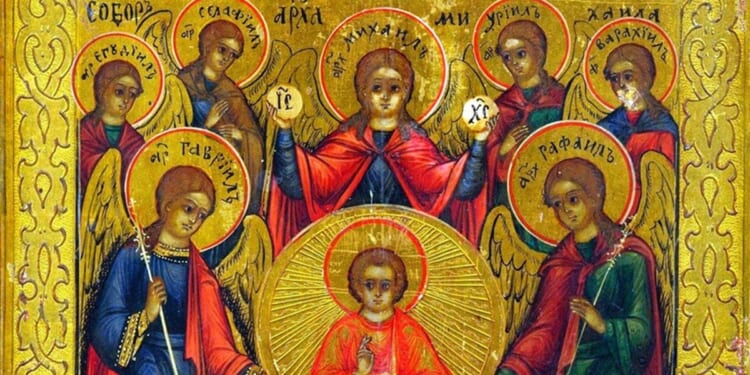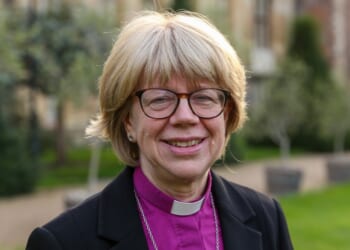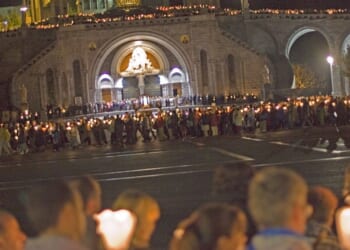AN ANGEL, as is well known, is a messenger. The word comes from the Greek ángelos (meaning “messenger”), via the Latin angelus, and the Old English engel. The same Greek word could refer to both mundane and heavenly messengers; in Christian writing, the second association has stuck. That bridge between earthly and heavenly heralds is present in the Hebrew malakh, for which ángelos was used in the Greek translation of the Old Testament.
Other words to do with news, such as evangel and evangelist (both about good news), have a related Greek origin. (The eu- part, by the way, means “good”, as in “euphoria”, a good feeling, and “eulogy”, when we speak well of someone.)
From a tapestry of different scriptural texts, the Christian tradition has come up with the idea of nine ranks or “orders” of angels, with angels at the bottom. Above them sit the archangels, a word attested twice in the New Testament (1 Thessalonians 4.16, and Jude 9, both referring to Michael). It simply means “chief angel” or “chief messenger”: arche means “chief” or “ruler”. We have the word in English via the Latin archangelus. (Arche can also mean “beginning”, as in the opening of John’s Gospel, or “first”, like the English words “principle” and “principal”, which come from the same Latin root.)
The prefix arch-, denoting something elevated, turns up in archbishop, architect, and archenemy. Beyond beginning with angels and archangels, the order of the hierarchy has been contested. Following the influential anonymous fifth- or sixth- century writer (probably Syrian) known as Pseudo-Dionysius, principalities come next, from the Latin principatus (derived from princeps, meaning “chief” and translating the Greek archai).
TRADITIONALLY, the nine orders are grouped in threes. Angels, archangels, and principalities belong together, as the orders that guide and defend people and nations. The next set of three orders — working upwards — are powers, virtues, and dominions. These are said to direct the universe more broadly. Finally come thrones, cherubim, and seraphim, who primarily contemplate and worship God. These names might be familiar from the hymn “Ye watchers and ye holy ones” by Athelstan Riley: “Seraphs, Cherubim and Thrones. . . Dominions, Princedoms, Powers, Virtues, Archangels, Angels’ choirs.”
The name “powers” (sometimes “authorities”) comes from the Latin potestates (translating the Greek exousai), from potens, meaning powerful. “Virtues”, from the Latin virtutes (Greek dynameis), has a similar meaning, while “dominions”, from dominations (translating kyriotetes, from kyrios, lord) means “lords” or “masters”.
AT THE bottom of the highest trio are the “thrones” (Latin throni, from the Greek thronoi), meaning seats, or the chair of someone in authority. These take us into the throne room of heaven, alongside the two highest orders: “cherubim” (from the Hebrew keruvim, plural of keruv, via Greek and Latin) and “seraphim” (Hebrew serafim, plural of seraf, via the same route).
The derivation of the Hebrew word “cherubim” is contested. It may align with the name of the protective spirits in Babylonian and Assyrian cultures, known as karabu in Akkadian, whose sphinx-like appearance mirrors those of the carved cherubim on the Ark of the Covenant (Exodus 25.18-22).
The terrifying cherubim appear in the Bible surprisingly often (Genesis 3.24; Ezekiel 10.15, 20; Psalm 99.1; Isaiah 37.16; 2 Samuel 6:2). The etymology of seraphim is clear, from the Hebrew verb for burning: they are the “burning ones”. They feature in the Bible only in Isaiah 6.1-7.
THE name “demon”, for a fallen angel, comes from the Greek word daimon. Originally, it meant a spirit or divine power rather broadly, not necessarily seen as evil. Christian theologians, such as Augustine in City of God, took any such powers to be fallen angels, giving “demon” its sense ever since.
From its earlier sense of being guardian or advising spirits, this word came to describe an important approach to ethics (“Eudaimonism”), emphasising virtue and character (from Socrates, through Plato, to Aristotle). Eu-daimon-ism is about being in harmony with your benign tutelary spirit, such that your character and actions cause it no shame.
THE scriptures warn us about getting too invested in detail when it comes to angels (Deuteronomy 29.29; Colossians 2.18; 1 Timothy 1.4; Revelation 19.10). Curiosity about their names has been a frequent transgression. Presumably, there is no harm in following the books of the Bible shared by all Christians, which obviously name two angelic beings (called archangels in the tradition, following Jude 9: Michael (Daniel 10.13, 21; 12.1; Jude 9; Revelation 12.7), and Gabriel (Daniel 8.16; 9.21; Luke 1.19).
“Michael” (Mikha’el in Hebrew) comes from mi (who) + kha (like) + El (God). His name is taken as a cry of defiance, against the claim that anything could be like God. “Who is like God?” Answer: nothing and no one! Since angels appear as representatives of God, or even as appearances or theophanies of God, however, the name might originally have meant the one who is like God. Gabriel’s name (Gavri’el in Hebrew) means either “God is my Strength” or “Warrior or Strongman of God”.
HONOURED in many but not all Christian traditions is a third archangel, Raphael (Rafa’el in Hebrew), meaning “God has healed” or “healing of God”. He appears as both guide and healer in the book of Tobit (3.17; 5.4-5). Alongside some Jewish traditions, the Orthodox Churches typically go further than the West in providing four further names, for seven archangels. Uriel turns up in 2 Esdras 4.1 — a book (also called 4 Ezra) that has the status of an appendix in the Roman Catholic canon (list of biblical books), but a more prominent place in the Slavonic and Ethiopian Churches — and in several places in 1 Enoch (only canonical for the Ethiopian Orthodox Tewahedo Church). Uri’el in Hebrew means “God is my light” or “Light of God”.
Also from that book (1 Enoch 20:4) we have Raguel (Hebrew Re’u’el), meaning “Friend of God”. The names hazarded for two other archangels lie entirely outside any biblical canon: Selaphiel (Hebrew She’altiel — “I have prayed to God” or “Prayer of God”), and Barachiel (Hebrew Barak’el — “Blessing of God”). All seven of these names end with El, the generic word for God in Hebrew and related Semitic languages.
NAMING seven archangels may overstep the mark; to go further would certainly be foolish. Staying with the biblical books, however, we can note the names of some demonic figures: Satan — Hebrew Satan, meaning accuser, translated as diabolos in Greek, eventually gave us the word “devil”. He is associated with the “shining one” or “morning star” (Hebrew helel) in Isaiah 14.12, which Jerome translated into Latin as Lucifer in the Vulgate.
Some interpretations of Leviticus 16.8-10 understand the banished goat to be sent to a demonic figure named Azazel, although Greek and Latin translations take it to mean “sent away” or “sent afar”. Azazel is discussed as a fallen angel in Enoch 8-10, 13. In Revelation 9.11, the name “Abaddon” (Job 26.6; Proverbs 15.11; Psalm 88.11 — from avad, to destroy), taken as part of, or synonymous with, Hades (a place or state) is transferred to a keeper of that place: the angel of the abyss — perhaps fallen, perhaps not — who is also given the equivalent Greek name “Apollyon” (from apollyomi, to destroy).
The Revd Dr Andrew Davison is Regius Professor of Divinity in the University of Oxford and a Canon Residentiary of Christ Church.

















